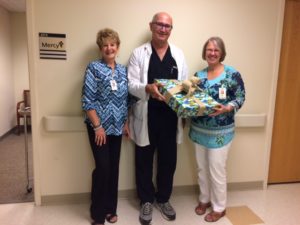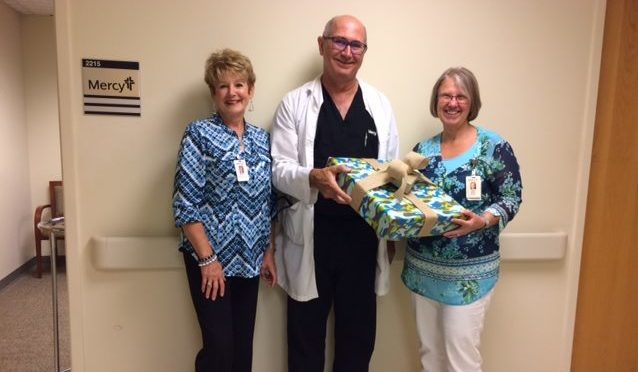Submitted by Tina Rockhold, Mercy Hospital
Dave Phelps M.D. retired from Mercy Hospital Fort Scott on August 1. He has been on staff in various capacities since July 1, 1979, when he and Dr. Randy Nichols joined the medical staff and the Basham-McKenna clinic after completing Family Practice Residency training at Wesley Medical Center.

Dr. Phelps practiced Family Medicine with Obstetrics and also developed his practice with an emphasis on Geriatrics, having Additional Qualifications in Geriatrics certificates granted. In 1996 when Fort Scott Family Physicians integrated with Mercy Health System, he served first as Medical Director, and later Chief Medical Officer for both Fort Scott and Independence. To be effective in that role he earned a Masters Degree in Medical Management from Tulane University. In 2003 he returned to active practice in Fort Scott fulltime as an Emergency Physician and was Physician ER Director until just recently as he made plans to retire from practice. As such, his career has concluded after 38 years of service to the Fort Scott community.
“When Randy Nichols and I came with our spouses, Karen and Deb, to Fort Scott to see the opportunity here, we just fell in love with the community,” Dr. Phelps says. “It was a very good idea. I remember when Dr. Basham retired in 1981, the Tribune asked him in an interview to list the greatest changes he had seen in health care in his practice. He practiced from the mid 1940s to 1980. I remember he named three: the development of vaccination and winning the fight with polio, the development and use of antibiotics including Penicillin, and finally, the practice of delivering babies at the hospital rather than at home.”
Dr. Phelps went on to say, “That got me thinking how I would answer the same question, with my practice from 1979 to 2017. Naturally there have been many advances in surgical technique and treatments, but I think what has changed is how we do things rather than what we do. Three things come to my mind about this: first, the development of the system-wide Electronic Medical Record allowing us access to a more complete information base regarding a patient, wherever we see them. This often includes their visits to other health facilities in Kansas.
“Second is the idea of Evidence-Based Medicine. Treatment choices now are based on scientific studies based on patient’s outcomes, rather than just ‘expert’ opinion in the field. This has changed a lot of medical practices. Such information is immediately available to doctors on line and updated every six months.
“Finally, the last is I think a mixed blessing. At the beginning of my career, individual and small group practices were the way to go. People usually identified a particular physician as ‘my doctor.’ But now, small practices are very hard to make successful, especially for primary care doctors. I firmly believe the development of health systems and taking care of patients in a team approach is absolutely necessary these days. It can be very effective. But, I kind of miss the relationships I had with so many fine people and the sense they thought of me as their doctor. That relationship could be powerful medicine sometimes.”
Upon his retirement Dr Phelps plans to spend more time with his wife Deb, do some sailing, a little fishing with friends and travel around a bit.
He said, “I’ll never forget Fort Scott and my friends there. It’s been a great place to practice.”
Mercy administration is currently recruiting a replacement for Dr. Phelps. In the interim, the Mercy Fort Scott’s Emergency Department is staffing with contractual physicians trained in emergency medicine.
